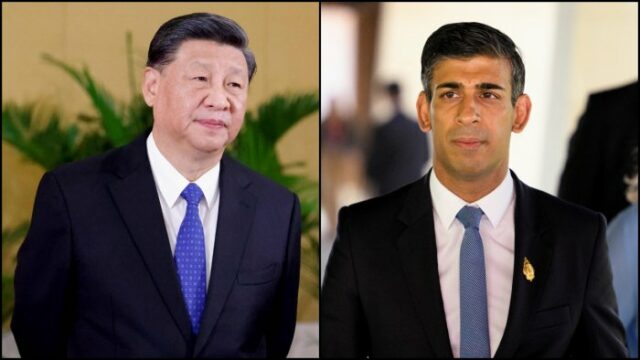NEW DELHI: An Inquiry report on China released by the Intelligence and Security Committee (ISC) of British Parliament last month accuses the government and the country’s intelligence agencies of sacrificing strategic interests for economic considerations.
“China’s size, ambition and capability have enabled it to successfully penetrate every sector of the UK’s economy, and—until the Covid-19 pandemic—Chinese money was readily accepted by HMG (Her/His Majesty’s Government) with few questions asked,” it says.
‘There is no unified voice within Government about what our China strategy is … not only do you need a strategy but you actually need people to know what the strategy is and to follow it, and you need the Chinese to know what your strategy is – and none of that applies,’ the report quotes Charles Parton, an expert on China at the Royal United Services Institute, as saying.
‘If the Government is serious about tackling the threat from China, then it needs to ensure that it has its house in order such that security concerns are not constantly trumped by economic interest,’ says the 222-page report, which was made public after redacting references which could compromise ongoing operations or sources.
“The Government says its response is robust and clear-eyed (but) The External Experts we spoke to were rather less complimentary. While we sought to examine whether the Government’s strategy for dealing with such a large adversary was up to the task, they felt very strongly that HMG did not have any strategy on China, let alone an effective one, and that it was singularly failing to deploy a ‘whole-of-government’ approach when countering the threat from China – a damning appraisal indeed.”
“One of the factors involved is that, until recently, our Agencies did not even recognise that they had any responsibility for countering Chinese interference activity in the UK. Instead, they focused their efforts on China’s ‘covert’ activity in the UK *** resources were diverted onto the acute counter-terrorism threat arising from Syria. Time and again resources have had to be diverted to tackling the terrorist threat, and it is clear that, historically, China did not receive as much attention as ***,” it adds.
The Committee, comprising nine members drawn from both houses of Parliament nominated by the Prime Minister in consultation with the leader of the Opposition, is responsible for the oversight of the UK Intelligence Community.
This includes three Agencies– MI5, MI6, and Government Communications Headquarters (GCHQ) which provides signals intelligence and information to the government and armed forces—and four Departments—Defence Intelligence (DI), Joint Intelligence Organisation (JIO), National Security Secretariat (NSS) and Homeland Security Group (HSG).
Work on the report began in November 2017 and was continued by the current committee, which was formed in November 2019.
“The length of this Inquiry has allowed us to see the development of the China policy within Government and we are reassured that, belatedly, the security aspects are now being given prominence – notably more so after the pandemic,” the report concedes.
“It is nevertheless concerning that the security community, and the Government in general, were aware of many of these issues several years ago and yet we are only now beginning to see the introduction of measures taken to protect UK sovereign interests. The lack of action to protect our assets from a known threat was a serious failure, and one from which the UK may feel the consequences for years to come,” it concludes.
‘The UK Intelligence Community assesses that: “The Chinese government is agnostic about the means employed to achieve its objectives. It is willing to pull on whichever lever is most likely to succeed, often employing multiple levers at the same time,” ’ it says.
‘China is seeking both political influence and economic advantage in order to achieve its aims in relation to the UK,’ it says. ‘It seeks to acquire information and influence elites and decision-makers, and to acquire Intellectual Property using covert and overt methods to gain technological supremacy.’
To compound the problem, the report notes, ‘it is not just the Chinese Intelligence Services: the Chinese Communist Party co-opts every state institution, company and citizen. This ‘whole-of-state’ approach means China can aggressively target the UK, yet the scale of the activity makes it more difficult to detect…’.
But despite all this, ‘Even now, HMG is focusing on short-term or acute threats, and failing to think long term – unlike China – and China has historically been able to take advantage of this,’ says the report, adding: ‘…it is worrying that ‘policy ownership’ of this national security activity, rather than being gripped at the centre by the Cabinet Office, has instead been devolved across the Government – in many instances to departments with no security remit or expertise. We have not been kept informed of these developments and, despite numerous requests, are not permitted to scrutinise this activity.’
Effective Parliamentary oversight is not some kind of ‘optional extra’ – it is a vital safeguard in any functioning Parliamentary democracy, and the ISC is the only body that can do that, it argues. Therefore, ‘Moving responsibility for security matters to bodies not named in the ISC’s Memorandum of Understanding is not consistent with Parliament’s intent in the Justice and Security Act 2013: the Government should not be giving departments a licence to operate in the name of national security and hiding it from view,’ it says.
‘It is for this reason that we are still formally seeking to amend the Committee’s Memorandum of Understanding (MoU) with the Prime Minister to include several relevant policy departments within the purview of the Committee’s oversight remit. This is a small change which will have a significant impact on national security – and upon the trust placed by the public in Ministers who are charged with weighing up fundamental interests behind closed doors.’
Also see:
















